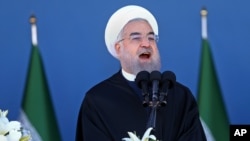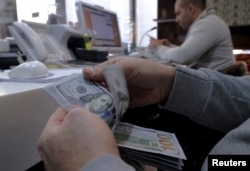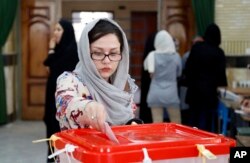Foreign business leaders have descended on Iran this year, eager to jump-start deals worth billions of dollars as international sanctions against Tehran are lifted, under last year's agreement to set limits on Iran's nuclear program.
For Iranian President Hassan Rouhani, who consolidated his support in the final round of parliamentary elections last week, it's a sign that the nuclear deal, his premier accomplishment to date, is working.
But the promise made to the Iranian people - economic growth on a scale that would change their lives - has yet to materialize, according to analysts. And as remaining U.S. sanctions continue to bar many financial dealings with Iran, Rouhani now faces a deadline.
Political developments in both the United States and Iran could alter the future of the deal, according to Sanam Vakil, an associate fellow at the London-based think-tank Chatham House. A new U.S. president will take office in January, and any of the current candidates is likely to be harder on Iran than President Barack Obama, she says.
Iran's presidential election is coming up next year, and Rouhani’s ability to implement promised economic reforms will be in the spotlight.
“Rouhani’s window for economic reform and political change has narrowed,” Vakil explains, “He has nine months of Obama leniency before the next U.S. president steps up rhetoric and steps up pressure on the Iranian government.”
Economic growth slow
Vakil adds the economic growth Iranians expected after the nuclear deal is still stymied by investors' uncertainty, continuing U.S. sanctions and fear of “snapback” policies written into the deal.
Iran has already scaled back its nuclear program in accordance with the deal, according to the International Atomic Energy Association, but if Tehran is found to have misled the world community, economic sanctions could, as they say, snap back into place quickly.
“A lot of international investors have not returned into the Iranian market in a way that was expected,” says Vakil, “Because they are uncertain as to the ramifications and ... the legal implications of remaining U.S. sanctions.”
Iranian officials do not blame their situation on the remaining sanctions. They blame U.S. officials, for not assuring the business community that it is now acceptable to negotiate with Iran, as diplomats from the United States, Russia and the European powers did, without fear of reprisals or punishment.
"The most important problem is that the United States is taking a back seat after eight years of scaring everybody off, imposing heavy penalties on people who wanted to do business with Iran," Iranian Foreign Minister Javad Zarif told the New Yorker magazine last week.
"Billions of dollars of penalties were imposed on various European financial institutions” while the sanctions were in effect, Zarif said, and after the agreement was signed, "The United States was supposed to go to various banks and tell them bygones are bygones" - that the problems of the past should remain in the past.
Parliamentary elections
The last round of elections in Iran for parliament and the leading religious body, the Assembly of Experts, concluded last week with a clear win for progressives who support Rouhani’s reform programs.
The new 290-member parliament will have a record number of 17 women and a record low of 16 clerics. However, Alex Vatanka, an Iran expert at the Washington-based Middle East Institute, cautions that this does not indicate a grand shift in society, since Supreme Leader Ali Khamenei still wields more power than anyone in the civilian government.
“Change in Iran will not come about in a large-scale fashion," Vatanka says, "because the Supreme Leader will only go along with piecemeal change, baby-step change - nothing too radical. But the fact that these women have been elected is a good sign.”
Iranian elections are often criticized abroad because the nation’s religious leaders can veto candidates. Thousands of potential candidates, many of whom supported reform, were disqualified from this year's parliamentary voting. Human Rights Watch says their removal was "based on discriminatory and arbitrary criteria.”
Still, Vatanka says, the vote was significant and it will have an impact, because reformers won all seats in Tehran, the capital and “political soul” of the country.
"It would be a mistake to entirely dismiss these elections,” he explains. “Because even within the pool of candidates that are allowed to run you will actually find plenty of nuances and sometimes distinct world-views about what Iran ought to look like at home, or what Iranian foreign policy ought to be."
Hardliners
Powerful figures in both Iran and the U.S. are still opposed to the Iran nuclear deal, and players on both sides would like to see it derailed, according to Theodore Karasik, senior adviser to the consulting firm Gulf-State Analytics, based in Washington.
The Iran deal, according to critics in both countries, is a pact with an enemy, bound to end in a betrayal.
Lawmakers in the U.S. capital blocked a major spending bill last week as a result of their unhappiness about the deal with Iran. And some American lobbyists are working to persuade investors to avoid Iran, even as the Obama administration seeks to encourage investment by clarifying current regulations.
Opposition on each side fuels negative sentiment in the other country, Karasik explains.
"Major U.S. companies are still hemmed in by core sanctions,” says Karasik. "This has put Iranians who have said ‘this is good for Iran’ under pressure," leaving them instead with the message: “You see? You can’t trust the United States."
Iran's American opponents accuse Tehran of funding terrorism through its extensive support for Hezbollah, which is both Lebanon's most powerful political party and a U.S.-designated terror group.
The United Nations last week offered to try to mediate a dispute between Tehran and Washington, after Iranian officials were enraged by a U.S. Supreme Court ruling that Iranian assets should be used to pay $2 billion to victims of terror attacks linked to Iran.
There also is bigotry on both sides, marked by openly anti-Islamic speeches by some American politicians, while an organization in Tehran hosts a “Holocaust cartoon contest,” a venue for denying that the Holocaust ever took place.
However, Iranians and Americans also have vested interests in seeing the deal succeed, and hopes that it could improve relations, says Vatanka of the Middle East Institute.At the very least, all parties agree that a military confrontation between the U.S. and Iran would be a disaster.
“This is a fragile process,” he adds.“We are nowhere close to a place where we can say, ‘The deal is safe.’”







